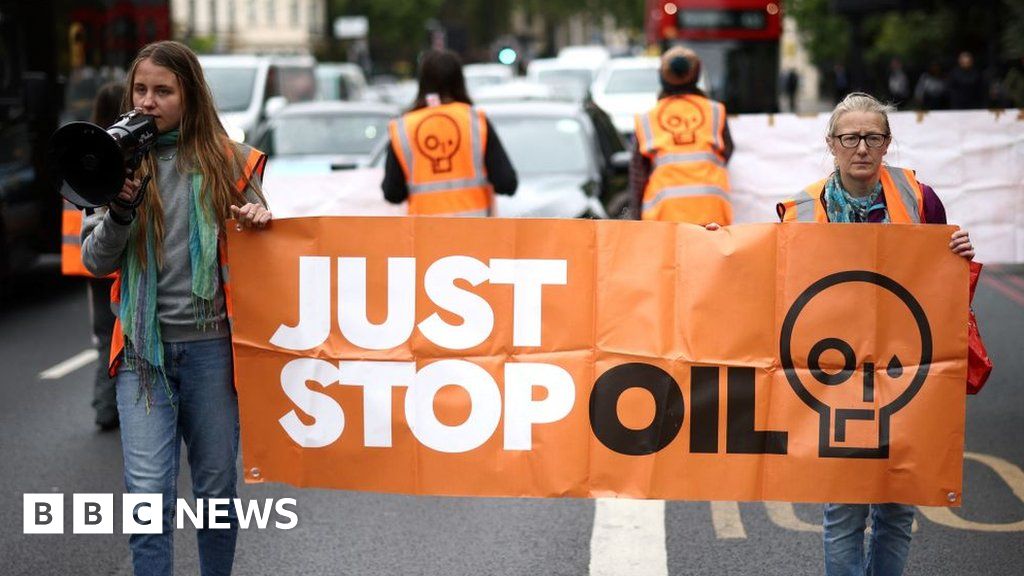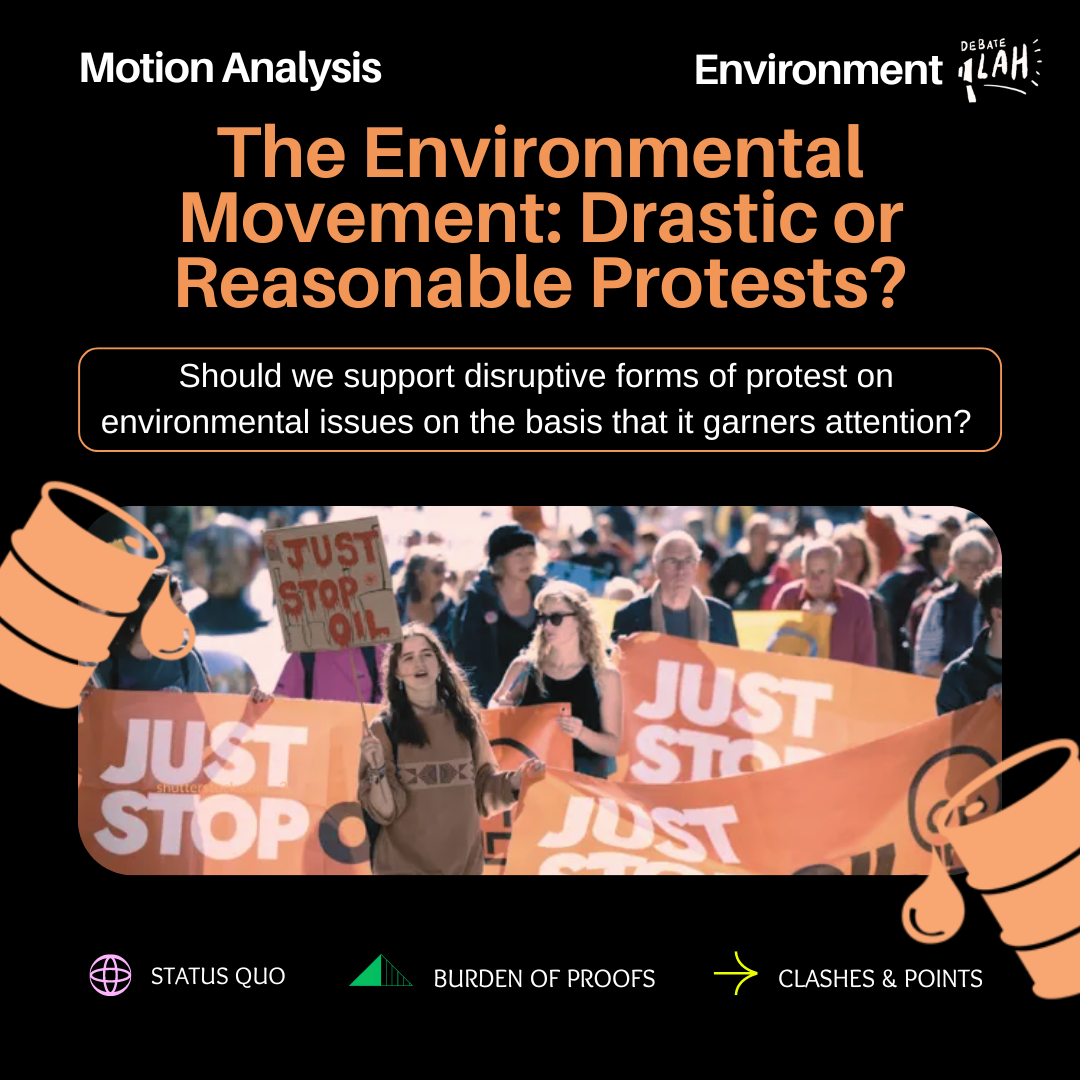Disclaimer: This is an analysis of a debate topic assigned to the speakers in the referenced video. This article and the referenced video do not reflect our views or opinions.
Just Stop Oil
Just Stop Oil is a British-based environmental organisation that has gained notoriety in the media for using "non-violent civil resistance" tactics in its advocacy. Such tactics include Just Stop Oil members sitting on the racetrack during an F1 race, blocking highways with marches, and blocking access roads to critical oil infrastructure, which disrupts the oil refinery process. Some of Just Stop Oil's objectives include demanding the UK Government stop licensing any new oil, coal, and gas projects in the country.
Some environmentalists agree with Just Stop Oil's methods of advocacy, believing all attention is good attention. They believe Just Stop Oil catches people's attention through their unique ways of protesting that headline media, meeting the need for awareness on environmental issues.
Most, however, deem Just Stop Oil's protests as "disruptive", believing there are more effective ways of advocating for environmental issues that can garner as much attention and most importantly, support from the public.
With Just Stop Oil and their protests being a highly debated topic, let us give you our analysis of the motion:
This house supports Just Stop Oil
This motion challenges us to think about advocacy, especially regarding major issues such as climate change. Let us know your opinion!
Status quo: Do we need drastic protesting measures to bring change?
The existence of environmental issues is undeniable. Advocacy brings awareness and change towards these issues, but are controversial tactics benefiting the environmental movement?
Proponents say that by supporting this agenda, they want to continue supporting the status quo by redirecting promotion from things like online activism or eco-terrorism to directly protesting in environments related to oil usage, such as sitting in the middle of a racetrack to make this agenda more tangible. This method will be the main tool for advocacy instead of using other methods.
They claim that Just Stop Oil's methods of protest are safe and bring attention to the environmental issues and changes they advocate for.
Opponents refute this as advocating for the transition to Green Technology is not exclusive to Just Stop Oil; it is a common thing advocated for amongst environmentalists. With this, opponents point to alternatives of protest that do not make the environmental movement look bad or violent. For instance, online advocacy has allowed us to gain mass support for certain social movements. Opponents say that Just Stop Oil's tactics are violent and controversial, as things like obstructing pipelines and vandalising public spaces are unlawful.
Opponents take 2 stances: 1, their house as the environmental movement would distance themselves from Just Stop Oil by having leaders of the environmental movement openly disassociate themselves with Just Stop Oil; 2, the changes Just Stop Oil advocates for can be brought without supporting them, like advocating for coal-based energy systems to transition into green energy systems. Methods of discourse and advocacy differ from Just Stop Oil on the Opposition side. Additionally, the Opposition side supports having politicians sit down with lobby groups and pressure groups to craft policies that convince them that environmental regulation is important.
#1 Effectiveness
Proponents claim that Just Stop Oil's protests reach a middle ground of safety and effectiveness. Current methods of activism are likely inapplicable and nonadaptive to our current agenda and mobilising it towards future opportunities. What does this look like? The procedures that environmentalists are taking in the status quo, i.e. online activism of sharing posts and boycotting are counterproductive as they can be shadow-banned or blocked, and tell other advocates and the public that their only responsibility is advocacy through social media. The responsibility for advocates to continue this movement stops. Besides that, other methods of eco-terrorism are risky as advocates are at risk of being sued or imprisoned as it is illegal to destroy oil settlements and others’ property. Eco-terrorism shifts discourse into destruction caused rather than the things environmentalists advocate for.
Why are Just Stop Oil's tactics exclusively beneficial? At most, advocates will probably just get removed from a race track they’re sitting on, but advocates still have innumerable alternatives of advocacy that will be as attention-grabbing as the last; this form of advocacy is much more sustainable. On top of that, the physical presence of advocates makes the advocacy more tangible. It evokes sentiment in the public where they feel the need to support and contribute to the environment. They gain lots of attention when advocating at highly publicised events and empower advocates as this is a new form of advocacy rather than the same old petitions and simply showing up at events. Proposition argues that Just Stop Oil's drastic measures are more effective as people voluntarily pay attention to their advocacies rather than advocates trying to find a place where people would care about their protests. Proponents say that they encourage active participation within the community of environmentalists, and even if they cause inconveniences, it’s still better than advocating through eco-terrorism.
Opponents argue that their side makes people likelier to support the environmental movement. They tell us that most people care about the environment as it affects them and their loved ones. However, Just Stop Oil’s methods of advocacy cause controversy and aversion to the environmental movement. Why? The media has limited space allocated to spotlight environmental causes, and Just Stop Oil is taking up all of that space due to controversies rather than achievements. The media would spotlight Just Stop Oil as they use controversial and aggravating methods to advocate for environmental change, making for interesting stories and headlines. Another point is politicians will weaponise the advocacy message of Just Stop Oil and use it against the environmental movement as controversial methods of protest become a weakness in the environmental movement’s strategies. Politicians can’t deny environmental issues, but they can say its advocacy is violent and should not be supported and this indirectly reduces support for the movement. Also, some politicians will avoid talking about the environmental movement for fear of sparking controversy.
People have an aversion to violence – it is seen as problematic and disproportionate. This is because although environmental issues are concerning, they are not at an apocalypse stage yet. Things like throwing soup at infamous paintings are responses that are hard for the public to connect to environmental issues as the public doesn’t see the problem through these forms of advocacy. Due to this, the environmental movement won’t appeal to the public. Therefore, opponents better convince the public to advocate for environmental issues.
In turn, Opposition brings two impacts: 1, in Proposition, people distance themselves from the environmental movement as it is deemed violent and disruptive. 2, politicians and governments can brush off the need to care about the environment on the premise that the movement’s methods of advocacy are dangerous.
#2 Support
Proponents say that Just Stop Oil's tactics are likely to get a response from the UK government. They claim that the organisation's advocacies are carried out legally, and may be carried out without many challenges until changes are made. They tell us that this is important as they pressure the government to cooperate. Their advocates are reasonable and prioritised as there is no valid reason to stop them from advocating for environmental causes. They argue the government must pay attention to them as their advocacies are all over news headlines, making it harder for their protests to be swept under the rug. Additionally, they counter the inefficiency of current methods of advocacy as they demand a response from the government rather than cater to the government's demands and get ignored.
Opponents negate this argument saying Just Stop Oil's strategy is unviable in the long term. Firstly, Just Stop Oil has and will receive backlash from the public. Mega corporations and oil giants fund pressure groups to cause chaos in public. These protesters are not under Just Stop Oil and the environmental movement; they are funded by corporations to weaponise the rhetoric of people being disrupted by the environmental movement's bizarre advocacy tactics. They are hired to do the exact things Just Stop Oil does to taint people’s perspectives on the movement, making many people turn against the environmental movement.
Furthermore, they disagree with Proposition's claim on the public researching environmental issues. Opponents argue that most people don’t research environmental issues, especially after seeing disruptive protests carried out; the public believes such advocacy tactics are harmful and will turn against the movement. Research doesn’t automatically lead to positive views on the environmental movement due to propaganda and misinformation. Moreover, people can turn against the movement even if they research because it is shown time and time again how such drastic protests harm the economy and disrupt people’s lives. People care about climate change because it affects their lives directly. The disruption caused by Just Stop Oil’s advocacies is more proximate to their lifestyles, and people will be upset when protests disrupt their daily lives. No one will allow this disruption for a potential improvement of the environment that isn’t even guaranteed yet.
Burden of Proofs
With fresh perspectives on both sides of the house, it's your turn to decide which convinced you more.
Proponents need to prove why Just Stop Oil's practices apply to the current environmental movement and why they are the safest practices available.
Opponents need to prove why alternatives are safer and still bring as much attention to environmental issues.
Do you support Just Stop Oil's advocacies with how much attention they gain? Do you think advocacy is better with large publicity or with more positive views and support?
Don't stop here!
Here's a summary document with both sides' framing and arguments discussing Just Stop Oil and their advocacies.
Read more on this topic if you're interested!

Lastly, thank you to the APWSDC 2023 Open Quarterfinalists for this fruitful debate!
Author: Jacquelyn Hon (@maongdebateclub on Instagram)


